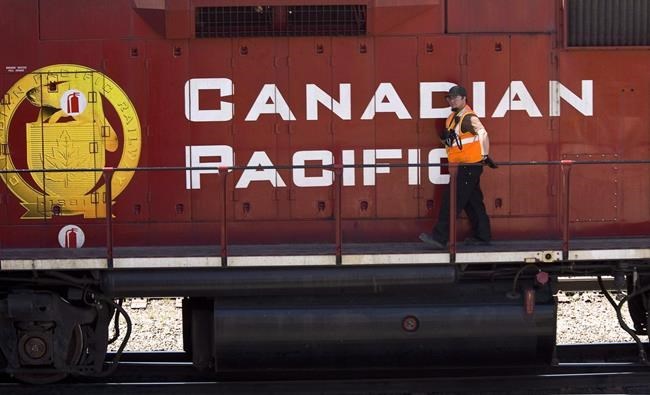MAPLE CREEK, Sask. — Canadian Pacific Railway says an investigation is underway following the release of a video showing one of the company's trains running over dozens of pronghorn antelope in southwestern Saskatchewan.
The video, which was obtained by Global News, shows a large herd of animals running on the tracks as the freight train's horn blasts.
Wildlife biologist Terry Kowalchuk, who's also a dean at Lethbridge College, said it was unsettling to see the animals — an iconic shortgrass Prairie species — being overtaken by the train.
"Their natural instinct is to outrun any sort of predator, any sort of disturbance," Kowalchuk said in an interview Wednesday. "That has served them well. Any natural predator can't catch them. It doesn't bode well for them when they get into areas where they can't outrun something like a vehicle or a train.
"The other problem is snow. They are not very well adapted to dealing with snow."
Canadian Pacific said in a statement that the freight train hit the herd on Nov. 15 west of Maple Creek.
"When an incident like this occurs, crews are required to report it to the CP Operations Centre," said the statement. "CP then alerts relevant stakeholders, including provincial authorities, about the wildlife strike."
Crews are not always able to safely stop a train to prevent a wildlife collision, because it takes a freight train time to come to a complete stop, CP added.
Saskatchewan Environment said in a separate statement that train collisions with wildlife are not uncommon, especially when animals are on the move in search of food or trying to avoid deep snow.
"Corridors such as railways and roadways make it easier for wildlife to get around," the ministry said.
"However, we do acknowledge that in the case of this collision, the number of pronghorn impacted was significant and distressing."
The statement said officials are in touch with CP about the collision and will be involved in any followup investigations.
It added that conservation officers have responded to four train collisions that killed more than 100 pronghorns between Nov. 9 and Nov. 20 — all of which were reported by the company.
Kowalchuk and Colleen Cassady St. Clair, a wildlife biologist at the University of Alberta who has studied train collisions with wildlife, said there could be ways to reduce deaths.
"If we want to stop this from happening, we would want to do something to intervene — slow the train down or stop the train to allow them to move off," said Kowalchuk.
Some may feel it's not economical to slow down trains on a regular basis, Cassady St. Clair suggested, but added "there might be a middle ground."
She said crews could be told when there are herds in the area, so they could slow down when the likelihood of collisions was high.
This report by The Canadian Press was first published Dec. 2, 2020.
— By Colette Derworiz in Edmonton.
The Canadian Press



